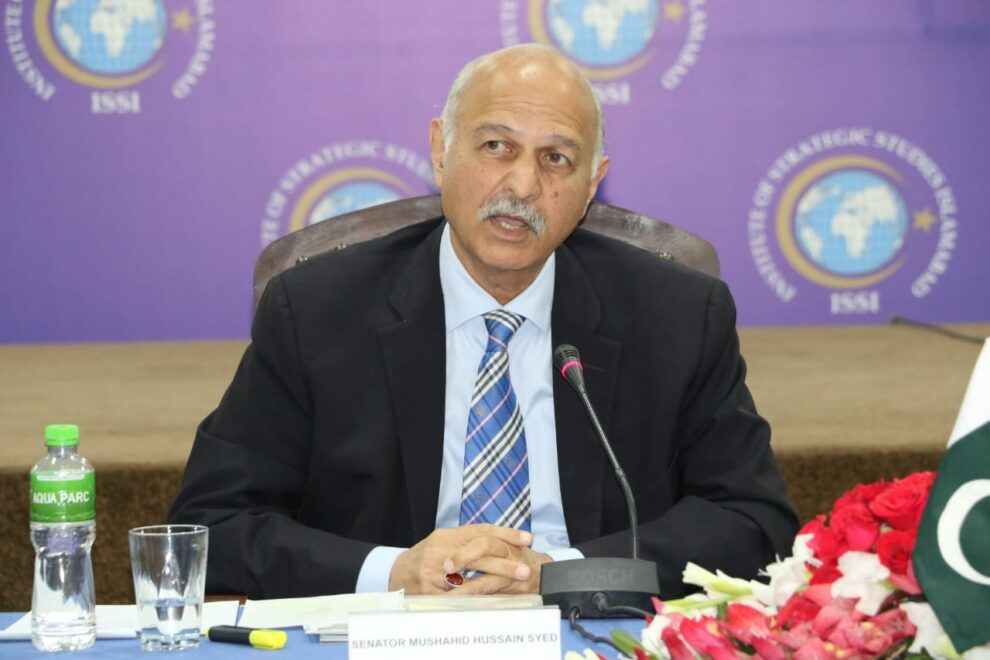ISLAMABAD – Chief Justice of Pakistan (CJP) Qazi Faez Isa remarked that the Constitution is very clear that the authority to form election tribunals lies with the Election Commission.
The CJP gave these remarks while heading a two-member bench of the Supreme Court seized with the hearing of the appeal of the Election Commission of Pakistan regarding decision of the high court about formation of the election tribunals.
Justice Naeem Afghan was the other member of the bench.
ECP Lawyer Sikandar Bashir began his arguments, submitting that the case involves the interpretation of Article 219(c) of the Constitution.
Upon this, the Chief Justice asked for a brief on the facts of the case, to which the Election Commission’s lawyer said that on February 14, the Election Commission wrote letters to all High Courts for the formation of tribunals, as this is within the Election Commission’s authority.
The lawyer explained that lists of judges’ names were requested from all High Courts via letters.
The Lahore High Court provided the names of two judges on February 20, and both were notified for election tribunals. On April 26, two more judges were appointed as election tribunals.
During the hearing, the Chief Justice stopped the lawyer when he used the term “respected” for the High Court. Chief Justice Qazi Faez Isa remarked that calling the High Court “respected” is reserved for judges. He inquired whether in England, Parliament is referred to as “respected.”
He pointed out that in Pakistan, parliamentarians do not respect each other and often use abusive language. He questioned why the Election Commission is not referred to as “respected” and asked if it is not worthy of respect.
Subsequently, the Election Commission’s lawyer mentioned that there was no dispute until the formation of four tribunals. Justice Qazi Faez Isa asked whether the Chief Election Commissioner and the Chief Justice could not meet. He questioned why everything in Pakistan has to be made controversial, citing the dispute over the election date between the President and the Election Commission. He wondered why the Registrar of the High Court was writing letters and suggested that if the Chief Justice and the Election Commissioner had met, a resolution might have been found.
Justice Naeem Akhtar Afghan added that there was no dispute with any High Court except the Lahore High Court, noting that tribunal proceedings in the Balochistan High Court were nearly complete.
Chief Justice Qazi Faez Isa asked if this was an issue of ego. The hearing was then adjourned until 11:30 AM, after which Chief Justice Qazi Faez Isa expressed anger towards the Election Commission over the conduct of elections and the establishment of election tribunals.
Chief Justice Qazi Faez Isa remarked that he could not understand why the Election Commission did not communicate with the Chief Justice of the Lahore High Court, as the Constitution does not prohibit such meetings. He questioned the necessity of making the Election Commission controversial and accused it of failing to conduct elections.
Additionally, Chief Justice Qazi Faez Isa raised questions about the presidential ordinance issued by acting President Yousuf Raza Gilani. He remarked that if governance is to be conducted by ordinance, then Parliament should be closed, stating that bringing ordinances is an insult to Parliament. He reiterated that the authority to form election tribunals lies with the Election Commission as clearly stated in Article 219 section (c). He criticized the complexity created by Supreme Court interpretations of the Constitution.
The Election Commission’s lawyer responded that he did not make the law and could not comment beyond generalities, and that he was not defending the ordinance. Chief Justice Qazi Faez Isa pointed out that he is responsible for cases in the Supreme Court and told the lawyer not to make excuses. The lawyer mentioned that there were about 62 judges in the Lahore High Court the last time he checked.
During the hearing, Chief Justice Qazi Faez Isa commented on the presidential ordinance concerning the formation of tribunals, questioning when the law for retired judges was made and how it could be changed through a presidential ordinance. He asked why an ordinance was brought after Parliament had already made a law, questioning the urgency that necessitated the ordinance. He suggested that the ordinance might interfere with the election process.
The lawyer explained that the ordinance was brought at the request of the cabinet and the Prime Minister. The CJP questioned whether the cabinet holds more significance than Parliament.
The Election Commission’s lawyer affirmed that Parliament holds more significance. At this, CJP Isa remarked that the ordinance contradicted the High Court’s decision.
The CJP later stopped Salman Akram Raja from using the term “hand-picked” for judges.
He questioned whether there were reservations about some judges of the High Court and asserted that such comments about the Lahore High Court would not be accepted.
He said that the term “hand-picked” was used in the ordinance and questioned the necessity of the ordinance after Parliament had already made a law.
He mentioned that interference in elections might also be a concern.
The CJP asked Salman Akram Raja whether the ordinance had been challenged. On it, Salman Akram Raja responded that the ordinance was challenged in the Lahore and Islamabad High Courts.
CJP Isa remarked that the ordinance applies nationwide, so why it was challenged in different high courts?
Source: Pakistan Observer















